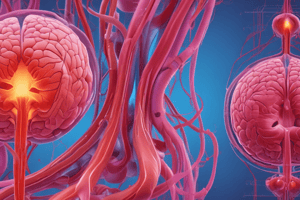Podcast
Questions and Answers
What is impaired tissue perfusion?
What is impaired tissue perfusion?
A decrease in nutrition and respiration at the cellular level due to a decrease in capillary blood supply.
What are some factors that can result in poor perfusion? (Select all that apply)
What are some factors that can result in poor perfusion? (Select all that apply)
- Conditions such as pregnancy (correct)
- Vascular disorders like hypertension (correct)
- Aneurysms (correct)
- Dieting
What are three things which influence tissue perfusion?
What are three things which influence tissue perfusion?
Anticoagulants, Anesthesia, Antibiotics
How do tissues perfuse?
How do tissues perfuse?
What is hypoxia and what causes it?
What is hypoxia and what causes it?
What is blood pressure?
What is blood pressure?
What is stroke volume influenced by?
What is stroke volume influenced by?
What is a 'closed system'?
What is a 'closed system'?
What is systemic vascular resistance influenced by?
What is systemic vascular resistance influenced by?
What role does the autonomic nervous system play in this?
What role does the autonomic nervous system play in this?
How does the Renin Angiotensin Aldosterone System work?
How does the Renin Angiotensin Aldosterone System work?
What are the neurohormones that influence systemic vascular resistance?
What are the neurohormones that influence systemic vascular resistance?
What are the local regulators that influence systemic vascular resistance?
What are the local regulators that influence systemic vascular resistance?
What are some age-related changes affecting blood pressure?
What are some age-related changes affecting blood pressure?
What are baroreceptors?
What are baroreceptors?
What is hypertension?
What is hypertension?
Flashcards are hidden until you start studying
Study Notes
Impaired Tissue Perfusion Overview
- Impaired tissue perfusion is a condition where there is insufficient blood supply, leading to decreased oxygen and nutrient delivery to cells.
- Vital for cellular functions, inadequate perfusion can result in tissue hypoxia and organ dysfunction.
Factors Influencing Perfusion
- Vascular disorders contribute to poor perfusion, including hypertension, atherosclerosis, and arteriosclerosis.
- Other conditions like pregnancy, dehydration, and malnutrition can also impair blood flow.
Influential Elements in Tissue Perfusion
- Anticoagulants, anesthesia, and antibiotics can have significant effects on tissue perfusion dynamics.
Mechanisms of Tissue Perfusion
- Red blood cells transport oxygen and nutrients to tissues through capillary networks.
- Oxygen intake occurs in the lungs, diffusing into pulmonary capillaries and then to systemic circulation.
- Hemoglobin facilitates gas exchange, delivering oxygen to cells and carrying carbon dioxide back to the lungs for exhalation.
Hypoxia Definition and Causes
- Hypoxia refers to insufficient oxygen at the cellular level, potentially caused by low hemoglobin, decreased blood flow, or impaired lung function.
Blood Pressure Fundamentals
- Blood pressure (BP) measures the force exerted by circulating blood on arterial walls and is influenced by cardiac output and systemic vascular resistance.
Stroke Volume Influences
- Stroke volume is affected by blood volume entering and leaving the heart as well as the strength of myocardial contractions.
Closed System Explanation
- The cardiovascular system is a closed system, meaning BP influences the arteries, veins, and heart chambers collectively.
Systemic Vascular Resistance Factors
- Influences include fluid volume (more fluid raises pressure), the sympathetic nervous system, and local regulators affecting vessel dilation and constriction.
Autonomic Nervous System's Role
- The sympathetic system increases heart rate and promotes vasoconstriction, whereas the parasympathetic system reduces heart rate and induces vasodilation, necessitating a balance for optimal function.
Renin-Angiotensin-Aldosterone System (RAAS) Function
- A decrease in kidney blood flow triggers renin release, which promotes vasoconstriction and increases fluid retention, thus elevating blood pressure.
RAAS Detailed Mechanism
- Low renal blood flow leads to increased renin, enhancing angiotensin production that stimulates aldosterone and ADH, elevating blood volume and pressure.
Neurohormonal Influences on Vascular Resistance
- Key neurohormones like angiotensin and norepinephrine act as vasoconstrictors, affecting systemic vascular resistance.
Local Regulators of Vascular Resistance
- Prostaglandins function as vasodilators, while endothelin (from endothelial cells) acts as a vasoconstrictor.
Age-Related Changes in Blood Pressure
- Aging may result in stiffer vessels, impaired baroreceptor function, and decreased renal efficiency in the RAAS, contributing to hypertension.
Baroreceptors Role
- Located in the aortic arch, baroreceptors detect pressure changes and can lead to orthostatic hypotension when they fail to respond appropriately.
Hypertension Definition
- Hypertension is characterized by consistent systolic blood pressure exceeding 140 mmHg and diastolic pressure above 90 mmHg, typically confirmed through multiple readings.
Studying That Suits You
Use AI to generate personalized quizzes and flashcards to suit your learning preferences.




